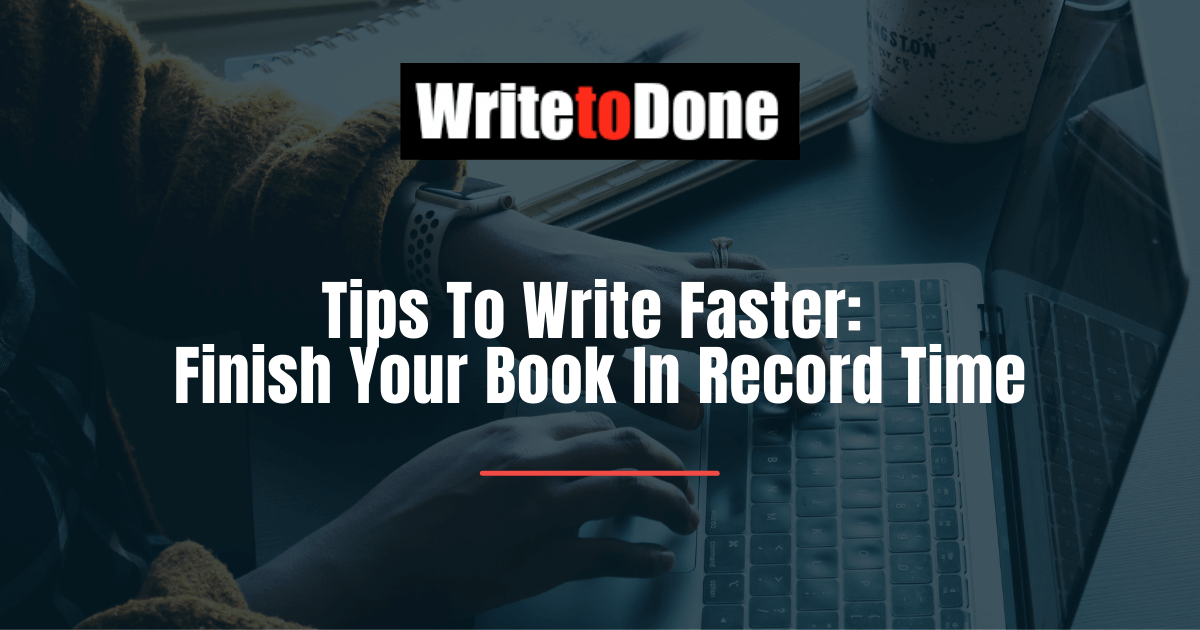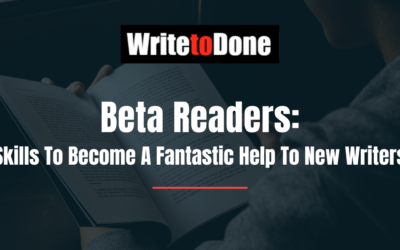Did you know that if you want to write faster than the average typist (40 words per minute) there are actionable steps you can take to do so? Whether you are working on typing out your debut novel or have been in the game for years, there’s always an opportunity to write faster.
Before we dive into the specifics of how to write faster, it’s important to discuss why it even matters. Why spend time learning how to get words down faster if you’re comfortable with your current process? I answer this question next. Ready to dive in?
Why Bother To Write Faster?
Learning how to write faster can not only help you crank out more books in less time, but also make use of your creative bandwidth. Think of it this way: If you have three hours to work on your story on a given day, and you approach the keyboard feeling fresh, what obstacles could hold you back?
If you have the mental capacity that day to crank out your word count, but your typing speed holds you back, your system will keep you from your goals.
But let’s take another angle. What if you finally entered a great stream of consciousness and the words are flowing, but you keep stumbling over the keyboard?
Learning to write faster not only frees up your time but also allows you to pursue your writing craft with one less obstacle. So, how do you learn to write faster?
#1 – Use Speech To Text Software
Writing faster does not always mean typing faster. Some of the most effective ways to get your draft down on paper is to use a speech to text software. Whether you choose a free version such as Google Docs offers or a paid version such as Dragon, speech to text is an extremely effective way to get those words down, and get them down fast.
#2 – Take A Typing Class
If you’re not a huge fan of speech to text, or you want the ability to linger over your words as you craft sentences, consider taking a typing class.
When I was in college, one of my professors typed with his index fingers. This slowed his process down as he could only type with two fingers. While this worked for him, if you are a full-time writer, typing will take up more of your time than lectures will.
You may want to consider investing in an online typing class to learn the best way to navigate the keyboard. Additionally, an ergonomic keyboard can help make your time at the keyboard more comfortable.
#3 – Make Use Of AI Writing Prompts
Maybe you want to write faster but you are already smashing through the average words per minute typing speed. You enjoy using speech to text software on occasion, but what’s really holding you back is not knowing where to take your story.
If this resonates with you, consider using AI writing prompts to help plot your story. Simply use your favorite search engine, type in “AI writing prompt generator,” and browse through your options.
While the prompts may not all fit your story needs, you’re bound to either find several prompts that do apply or at least feel inspired to create your own.
#4 – Plan Out Your Chapters
You can identify steps to write faster in a variety of areas—one of which comes down to plotting. Yes, speech to text software can be extremely helpful, as can learning to type efficiently, but there’s a catch. No matter how fast you type, if you don’t know what comes next, you can’t write faster.
This is where plotting comes in. If you outline your chapters prior to writing you create a guide for your allotted writing time. Rather than stare at your blinking cursor wondering what to write next, simply type out your pre-planned, next plot point.
#5 – Refuse Distractions
Perhaps most important in your quest to write faster is the most obvious, but underrated, point. It doesn’t matter if you:
- Use a speech to text software
- Type at 80 words per minute
- Use AI writing prompts
- Plot every chapter
…if you continually give in to distractions. If you have two hours to write and can crank out an average of 40 words per minute, but every three minutes you check your notifications, you won’t write as much as you could’ve. Instead, refuse distractions with the following steps:
- Tell your roommates, family, or anyone else present that you need to spend the next X amount of time without distraction.
- Find a quiet space to write.
- Turn off notifications and, if necessary, even your Internet.
Without distractions stealing your attention, you’re bound to write faster and work more effectively than you ever have before. Of course, use discretion when eliminating distractions. It may be wise to turn your phone on Do Not Disturb but allow emergency calls to come through.
Your Book Is Done. Now What?
Once you master the art of writing with speed, you will complete your draft in no time. There’s nothing that quite matches the feeling of looking at your completed manuscript and knowing you stuck to your deadline.
But now that you have a draft, what’s next? The last thing you want to do is leave a document on your computer or a stack of pages in your desk drawer for years to come.
After you draft your book it’s time to consider your publishing process. Whether you choose to self-publish or traditionally publish, it’s crucial to get your book into the hands of your intended audience. Here are some resources if you need guidance through your publishing process.
Writing Prompts For Your Next Endeavor
Once you publish your book and celebrate your tremendous achievement you get to repeat the process with your second (or third or fourth!) book idea. Choosing one idea is often an obstacle for creative writers. With so many ideas to choose from, it can be difficult to know which one to move forward with.
The good news is, no matter if you have too many ideas to count or feel like you need a bit of inspiration, writing prompts are a big help. Here are a few reasons why making use of prompts can level-up your writing:
- They inspire fresh angles on your current ideas
- You can mix and match writing prompts for an original plot
- They act as a free creative guide throughout your process
Perhaps most important is the fact that writing prompts are not reserved for only the beginning of your story. If you have a great idea but you get stuck midway through your fiction or nonfiction manuscript, simply reference a writing prompts list.
Writing prompts are meant to literally prompt you in your writing endeavors and can be extremely helpful if you feel stuck in:
- A subplot
- A character sketch
- How to end a chapter
- How to move the story forward
Of course, they can help in countless other instances as well! Make use of the resources mentioned above, linked below, and feel free to reach out with any questions. We’re happy to help you on your journey to write faster and publish more books!
Grab this free resource from our friends at Self-Publishing School.

















